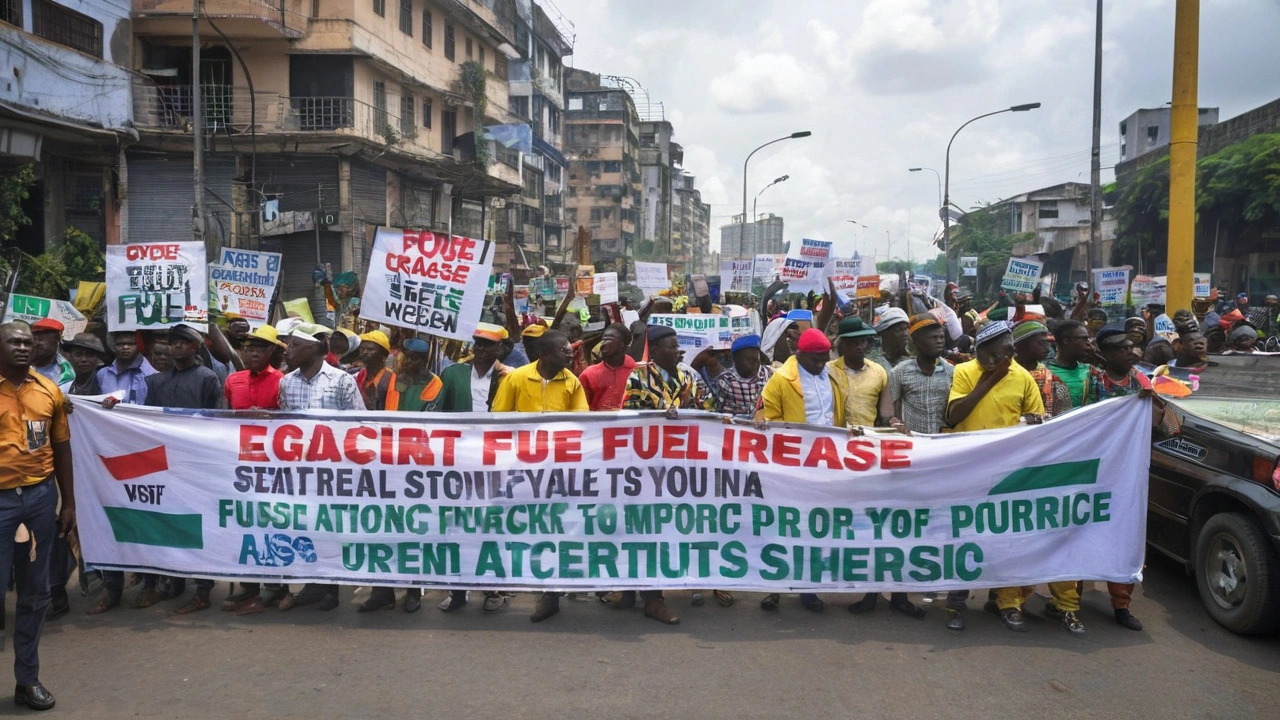Security Forces Clash with Protesters in Nigeria Amid Severe Economic Crisis
On Thursday, Nigeria saw a significant uprising as young protesters took to the streets in cities across the country to voice their anger over the worsening cost-of-living crisis. This eruption of dissent comes at a time when Nigeria, despite being one of Africa's leading oil producers, finds itself grappling with extreme poverty and widespread corruption.
The protests turned volatile when law enforcement officers resorted to using tear gas to disperse the gatherings. The situation was particularly tense in Abuja, the nation's capital, where a court ruling late Wednesday had confined the protest to a stadium. However, demonstrators assembled just a few kilometers from the Presidential Villa, prompting the police to intervene with tear gas. Similar incidents were reported in the northeastern states of Bauchi and Borno, regions already troubled by conflict.
Economic Disparity and Public Discontent
This public outcry underscores the stark economic disparity in Nigeria. While public officials are among the highest-paid in Africa, many citizens are battling hunger and poverty. The protesters' frustration is not merely about immediate economic woes but also reflects deeper issues of governance and corruption. As one of the protesters in Abuja, Jude Sochima, aptly put it, 'People are frustrated and upset because we deserve better.'
The protests caused significant disruptions, with demonstrators and heavily armed security forces alike blocking roads. The scale of the unrest prompted many businesses to shut down for fear of violence akin to the deadly protests against police brutality in 2020 or the recent chaos in Kenya over tax increases.
Human Rights Concerns
The aggressive response from the authorities has alarmed human rights organizations and activists who fear a potential crackdown. According to Human Rights Watch, there has been a 'troubling readiness to suppress dissent,' raising concerns about a violent response to the protests. The international advocacy group emphasized that the freedom to protest is a fundamental right that should be protected, not quashed.
Despite the government's ambitious economic reforms, the elimination of gas and electricity subsidies has hit hard, significantly increasing the prices of essential goods. Protesters are demanding the restoration of these subsidies, among other grievances. The displeasure is also directed towards the ongoing security crises in Nigeria's northern regions, an issue President Bola Tinubu had promised to address during his campaign. Fourteen months into his administration, the challenges remain, with some indicators suggesting a deterioration of the situation.
Protests and Political Responses
The protests, initially planned to last ten days, show no signs of abating. Omele Sore, a former presidential candidate and one of the protest leaders, announced that the demonstrations would continue until their demands are met. This steadfastness highlights the profound dissatisfaction among a significant segment of the Nigerian population.
Meanwhile, some factions organized demonstrations in support of President Tinubu, indicating a divided public opinion. However, the overriding sentiment among the broader populace seems to favor substantial changes to address the crippling cost-of-living crisis and systemic corruption.
A Nation at a Crossroads
Despite Nigeria's potential as an economic powerhouse thanks to its oil reserves, the wealth has not translated into improved living conditions for the majority of its citizens. The current unrest is not just a reaction to the immediate economic hardships but also a cry for justice and better governance. The high level of corruption among public officials only exacerbates the public's anger.
The protests across Nigeria are a stark reminder of the urgent need for effective reforms that address both economic inequality and governance issues. As the situation unfolds, the international community watches closely, hopeful yet cautious about the potential for meaningful change in Africa's most populous nation.
As this wave of discontent continues, the Nigerian government faces a critical test. How it responds to these protests and addresses the underlying issues will define the nation's trajectory in the years to come. For now, the streets remain a battleground where the voices of ordinary Nigerians cry for change.
Subsequent Developments and Global Implications
With the protests still ongoing, it is crucial to monitor the evolving response from both the government and international bodies. The potential for a broader regional impact exists, especially given Nigeria's pivotal role in Africa. The economic and social ramifications of these protests could resonate deeply, influencing policies and governance approaches in neighboring countries.
In conclusion, the current state of affairs in Nigeria is a complex tapestry of economic hardship, political discontent, and social unrest. The protests are a clear indication of the people's urgent call for a fairer, more just society. As Nigeria navigates these turbulent times, the pursuit of peace, stability, and prosperity remains the ultimate goal for its citizens.

